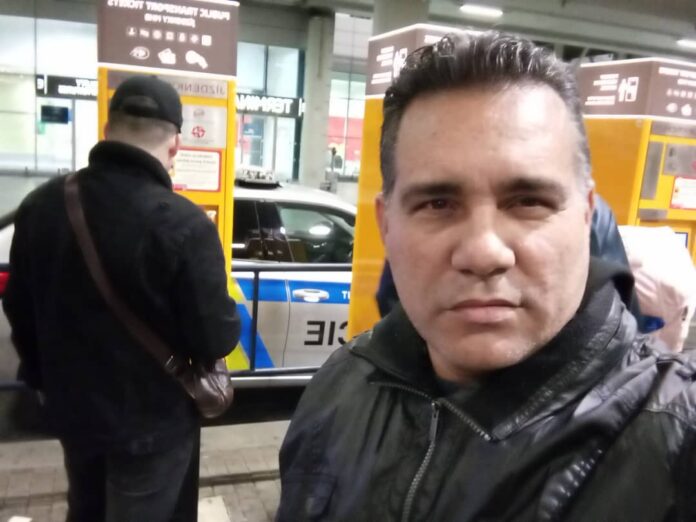
By Osmel Ramirez Alvarez
HAVANA TIMES – On March 8th, I returned to Cuba from Madrid on an Air Europa flight. A good company with excellent regular service. A long but peaceful journey, with comfort and modern entertainment at hand. I watched two movies, listened to music by Pablo Milanés from the available selection, and didn’t sleep. After almost ten hours of flight, we landed in Boyeros, at Terminal 3 of José Martí Airport in Havana.
The Cuban airport terminal is very different from Barajas in Madrid or Prague Airport, where I’ve also been. The lack of care is immediately noticeable, as well as the excess of useless controls, like small school desks in the middle of a hall to check an incomprehensible health form. Something stupid, which only serves for the officials to ‘suggest’ gifts to skip it if you forget to fill it out.

There’s always fear when dealing with Cuban officials. I didn’t feel it in Spain or in the Czech Republic where I also visited, but here in my own country, both when leaving and entering. It’s appalling, but that’s how it feels. Ultimately, there were no problems entering, and there were no issues with luggage either. My relatives were outside the airport to greet me, and I was already in Cuba, in my land, in my place.
Since then, everyone I’ve encountered, instead of saying ‘it’s good that you came back quickly’, they ask me, ‘why didn’t you stay? Why did you come back? What happened to you?’. Returning to a country where as soon as a baby learns to speak, before saying ‘daddy’, they say ‘I want to leave Cuba’, makes me feel like a strange creature.
But the truth is, it’s very hard to return to your own country knowing the disaster that exists here with endless blackouts, shortages, high inflation, and worst of all, repression if you protest, while being in a place where everything works. Among other things, thanks to capitalism and democracy. As a critical citizen and opponent of the system, and as a non-government communicator, returning is also a challenge and a danger.
But mine wasn’t a migration trip but a visit. My colleagues and friends from Diario de Cuba invited me to get out of this heavy environment for a while, after all kinds of repression, following a pandemic that almost killed us and then more crises. Besides, beyond being consistent with the objectives of my trip, staying in Cuba is my plan A, and here I had my wonderful family waiting for me, who are my driving force, my greatest wealth: my wife, my three children, my parents, my sisters, nephews, and more.
Emigrating is so commonplace now that it seems normal to us, and the abnormal thing is to return. That’s where we’ve reached in Cuba, where nothing works, and everything has gone awry. I was lucky because until the day before I arrived, there were blackouts of up to 15 hours in my neighborhood, but thanks to the fact that the freshwater pumping wells for the Felton thermoelectric plant are located here, and with the blackouts, they had empty tanks, they had to leave us without blackouts and I’ve only had two.
But, in just two months of being away, it’s noticeable how the crisis is exponentially deepening. On the 25th of March, something arrived through the ration booklet, barely two pounds of rice and only to some bodegas, as there is still not enough for everyone. A sack of charcoal, which cost 300 pesos when I traveled in January, I found it at 800 pesos, due to the lack of electricity to cook food. While the liter of gasoline, which was 250, had more than doubled to 600 pesos, and it’s not readily available even at that price.
A carton of eggs, which was 2,000 pesos, rose to 2,800. Imagine my father, who worked for over 40 years to ensure his and my mother’s old age, with a monthly pension of 1,500 pesos, and it only covers 15 eggs. That’s why the people are much more restless, discontented, irritated, despising the system, not believing even a little bit in the government’s arguments or excuses, and much less in its plans. People just want to emigrate and help their families from abroad.
In the midst of this disaster and so much madness, I returned to my home from Spain. From impeccable asphalt to endless potholes; from endless electricity to blackouts; from markets overflowing with everything and at affordable prices, to shortages and exorbitant prices, from freedom to fear.
But I returned with my family, to keep surviving, inventing, without stopping advocating for a Better Cuba, for political democracy with economic freedom and full human rights that I desire and dream of for Cubans. I want all of that here in my Cuba, not to emigrate to achieve it elsewhere, not to separate from my children, my wife, and my sick parents who need me close.
And I hope not to get tired of it. I hope that the change we are pushing for is possible and that we stop fearing the police without being criminals; that economic freedom makes it possible for electricity to be sufficient and markets to be full, that fields are planted, and salaries are enough to live decently.
I wish and work at the risk of being repressed again at any moment, so that sooner rather than later, political democracy allows us to choose our leaders without violence or exclusion of some Cubans against others, respecting the majority. Right here in Cuba, in our Cuba, which belongs to all Cubans. We must continue dreaming and working tirelessly, even if it seems like an eternal struggle.
Read more from Osmel Ramirez’s dairy here on Havana Times.




